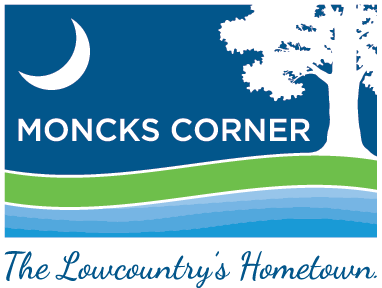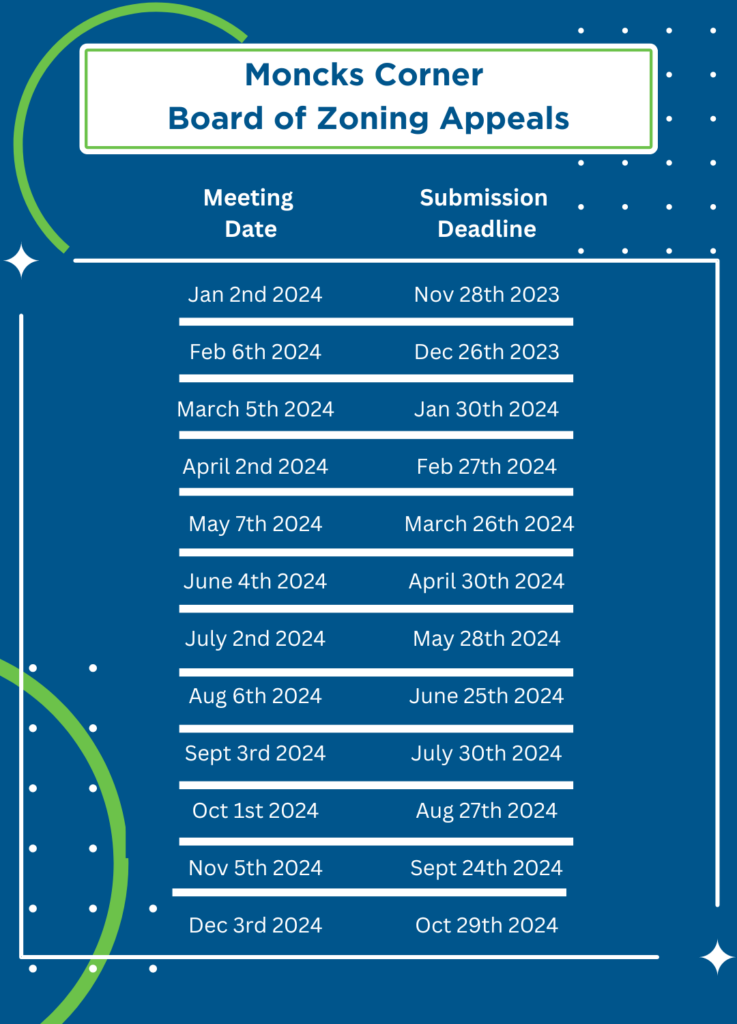Home / Government / Boards & Commissions / Board of Zoning Appeals
Board of Zoning Appeals
- Home
- Boards & Commissions
- Government
- Board of Zoning Appeals
Commissioners
-
Theresa McLaughlinuntil 01/2025
-
Clayton Mortonuntil 01/2025
-
Thurman Pellum Chairuntil 01/2025
-
Carolyn Haynes Smithuntil 01/2024
-
Pat Smithuntil 01/2024
TheTown of Moncks Corner Board of Zoning Appeals meets monthly on the first Tuesday at 6pm at Town Hall located at 118 Carolina Ave, Moncks Corner, SC 29461.
ABOUT BOARDS OF ZONING APPEALS IN SOUTH CAROLINA
The powers of the board are limited to three specific subject matter areas: determining appeals from administrative decisions of the zoning administrator, granting or denying applications for variances, and granting or denying applications for special exceptions.
The board has the exclusive power to hear and decide appeals where it is alleged the zoning administrator, in the enforcement of the zoning ordinance, erred in an order, requirement, decision or determination. In such cases, the board may reverse or affirm, wholly or in part, or may modify the order, requirements, decision or determination of the zoning administrator. The board has all the powers of the zoning administrator in such cases and may issue or direct the issuance of a permit.
When deciding an administrative appeal from a decision of the zoning administrator, the board is not bound by the conclusion or reasoning of the zoning administrator and may consider and apply the appropriate provisions of the zoning ordinance as dictated by the facts before it. Clear Channel Outdoor v. City of Myrtle Beach, 360 S.C. 459, 602 S.E.2d 76 (Ct. App. 2004)(BZA not restricted on appeal to denial of billboard permit on sole basis offered by zoning administrator).
The board has the power to hear and decide appeals (requests) for variances when strict application of the zoning ordinance would result in unnecessary hardship.
A variance allows the board to modify an otherwise legitimate zoning restriction when, due to unusual conditions, the restriction may be more burdensome than was intended. The variance must not impair the public purpose. To obtain a variance on the ground of unnecessary hardship, there must at least be proof that a particular property suffers a singular disadvantage through the operation of a zoning regulation. An owner is not entitled to relief from a self-created or self-inflicted hardship. A claim of unnecessary hardship cannot be based on conditions created by the owner nor can one who purchases property after the enactment of a zoning regulation complain that the nonconforming use would work a hardship upon him.
When deciding whether to grant or deny a variance, the board has some discretion; however, the board is not free to make whatever determination appeals to its sense of justice. The board must apply the standards prescribed by the zoning ordinance and the 1994 State Planning Act. Courts will not uphold a decision of the board to grant or deny a variance based on errors of law, fraud or lack of supporting evidence, or a board action that is arbitrary, unreasonable, discriminatory or an abuse of discretion.
The board may grant a variance in an individual case of unnecessary hardship if the board makes and explains in writing all of the following findings.
- Extraordinary conditions. There are extraordinary and exceptional conditions pertaining to the particular piece of property. Extraordinary conditions could exist due to size, shape, topography, drainage, street widening, beachfront setback lines or other conditions that make it difficult or impossible to make an economically feasible use of the property.
- Other property. These conditions do not generally apply to other property in the vicinity.
- Utilization. Because of these conditions, the application of the ordinance to the particular piece of property would effectively prohibit or unreasonably restrict the utilization of the property.
- Detriment. The authorization of a variance will not be of substantial detriment to adjacent property or to the public good, and the character of the district will not be harmed by the granting of the variance.
Other factors applicable to a variance also are prescribed by S.C. Code.
- Profitability. The fact that the property may be used more profitably, if a variance is granted, may not be considered as grounds for a variance.
- Conditions. In granting a variance, the board may attach conditions to it. These conditions may affect the location, character or other features of the proposed building, structure or use as the board may consider advisable to protect established property values in the surrounding area or to promote the public health, safety or general welfare.
- Use variance. Generally, the board may not grant a variance that would allow the establishment of a use not otherwise permitted in a zoning district, physically extend a nonconforming use of land or change the zoning district boundaries shown on the official zoning map. However, the 1994 Act does allow use variances to be authorized by a local zoning ordinance. Nevertheless, granting use variances is not a good zoning practice and is not recommended.
The board of appeals has the exclusive power to permit uses by special exception subject to standards and conditions in the zoning ordinance. The zoning ordinance must include the standards and conditions the board must follow when considering such appeals. Standards and conditions for special exceptions could relate to access, noise, screening, lighting, compatibility with adjoining uses and traffic generation. In some zoning ordinances, conditional uses granted after review should be designated as special exceptions.
Appeals to the board and appeals from decisions of the board must follow the prescribed procedures. Appeals from administrative actions and decisions of the zoning administrator are taken to the board of zoning appeals, then to circuit court and finally to the state appellate courts. An appeal from an administrative decision of the zoning administrator is never taken to the governing body. Except for appeals of board decisions on use variances, appeals from decisions of the BZA on variances or special exceptions also are taken to circuit court and finally to the state appellate courts.
Staff
Justin Westbrook
Community Development Director843-719-7913

